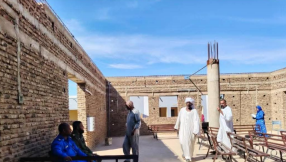This is a blog post by the Revd Canon Anna Norman-Walker, rector of St Leonard's, Streatham. It first appeared on ViaMedia.News and is reproduced with permission.
In Greek mythology Pandora is created by Zeus and given as a wedding gift to the brother of his enemy Prometheus along with a jar containing the many evils of the world. Pandora opens the jar and on realising what she had done she tries to close it in haste; the anguish of the moment is captured in a painting by FS Church in which the young bride kneels helplessly on the box - as one might an over filled suitcase - in an effort to contain the escaping forces of evil.
Over the past few weeks the call has gone out for the church to address the issue of spiritual abuse. This was triggered in part by a recent report carried out by Bournemouth University on behalf of the churches Child Protection Advisory Service (CCPAS) in which 62 per cent of respondents to the study's research survey believed they had been subject to spiritual abuse. Within a few days of the report's release, news broke of the Oxford priest Revd Timothy Davis' suspension from duties for the spiritual abuse of a teenager he had been mentoring following an investigation under the Clergy Discipline Measure.

This case and the report itself has highlighted the urgent need for the Church of England to provide some clear definition of what spiritual abuse is and provide guidelines for parishes to follow in order to ensure good practice and the safeguarding of both those who may be vulnerable to spiritual abuse, and the alleged perpetrators of it.
I for one would welcome such a development and as General Synod gathers in a week or so's time, I hope that space will be made for the issue to be raised which might lead to the commissioning of a much-needed piece of work.
However, as vital as this work is, we should be prepared for the opening of our own Pandora's box.
Just as #metoo went viral on social media as women all over the world acknowledged their experience of sexual harassment, the church may very well have to navigate a similar response from those whose experience of spiritual abuse.
The Oxford case was clearly a gross abuse of power but where should the lines be drawn?
I can still recall vividly at the age of 13 sitting in a tent meeting on the final night of a Christian youth camp at which the leader, who we all adored, delivered the invitation to 'stand up for Jesus' and 'make a commitment to follow him for the rest of our lives'. My rear was firmly glued to the chair, partly out of extreme embarrassment, but also by a genuine uncertainty that I was up for it. One or two 'keenies' jumped to their feet but there wasn't what you would call revival breaking out. Then the leader said 'The devil is pinning some of you to your chairs – come on, stand up for Jesus – don't let the devil win!' Immediately children were jumping to their feet all around me, one or two bursting into tears. I wasn't going anywhere, and I was left with the sneaky suspicion that I was working for the opposition!
Was that my #metoo moment? Did some of those there look back and feel taken advantage of, abused?

I don't know (I am delighted to 'stand up for Jesus' these days) but my point is that I have no doubt the wonderful camp leader sincerely believed that the devil was pinning the children to their chairs (mine included) and he sincerely believed that we needed saving from powers of darkness and I have no doubt he gave thanks to God that evening when we were all tucked up in our sleeping bags, that the victory had been the Lords at the meeting that night. I slept very well rather enjoying my rebel status, but what about those who had cried and stood trembling as they made their profession early in the evening?
What about the thousands of impressionable young people who flock to the front at youth events seeking prayer for a wide range of issues in their lives? Does sincere belief mitigate against a claim of spiritual abuse? From 'Father knows best' to 'The Lord has told me' churches; thin ends and wedges come to mind....
Faith and belief are complex issues and what is or is not coercion or the abuse of power will be hard to define in many instances. What some experience as abusive or damaging, others will welcome as the work of the Spirit and the discipline of discipleship. Is it possible or desirable to legislate for the experience of another?
For many I suspect the realisation of spiritual abuse will remain undefined and unexpressed until the maturity of adulthood or the gift of hindsight is available to them.
What the church needs to be clear about is that the issue of spiritual abuse and the stories of its victims are not going away.
Pandora's box is already open and we would be very unwise to try and shut it.
The saddest thing about the story is that by the time Pandora managed to shut the box there was left inside just one thing and it was 'Hope'.
Any attempt to dodge the issues at hand here would likewise smother hope for many.
We need to open this issue up, it will be painful and I don't know where the boundaries should be drawn, but we can't duck it if we are genuinely to be a Church of healing and flourishing.
Revd Canon Anna Norman-Walker is the Rector of St Leonard's Streatham and a past member of General Synod.













